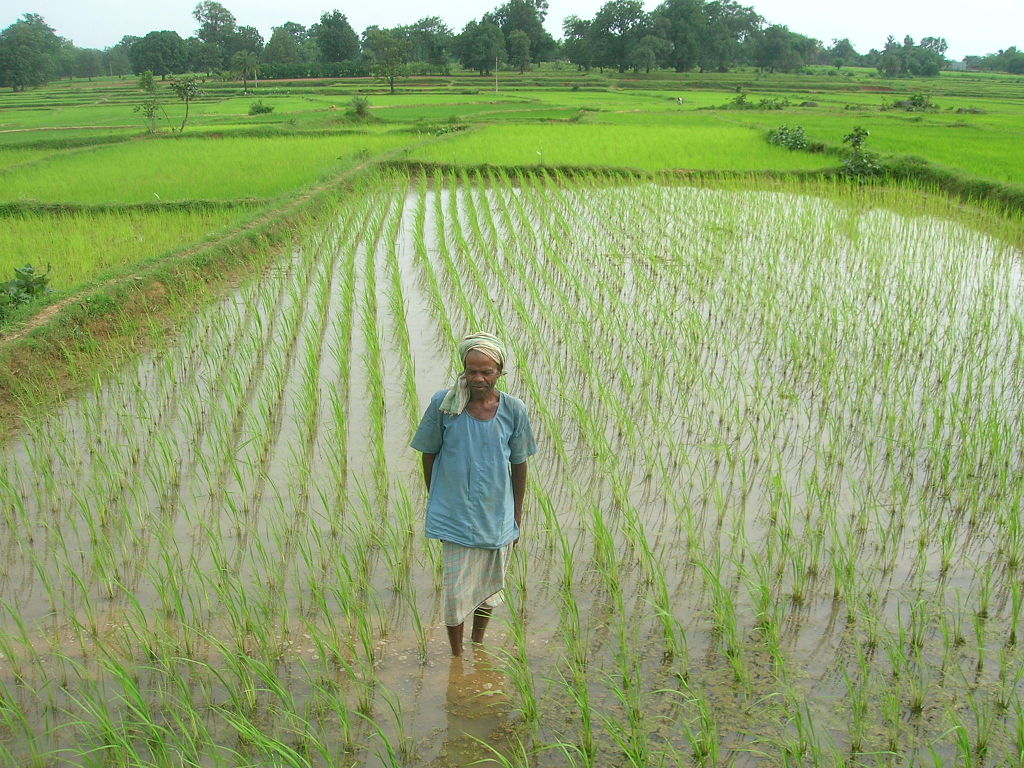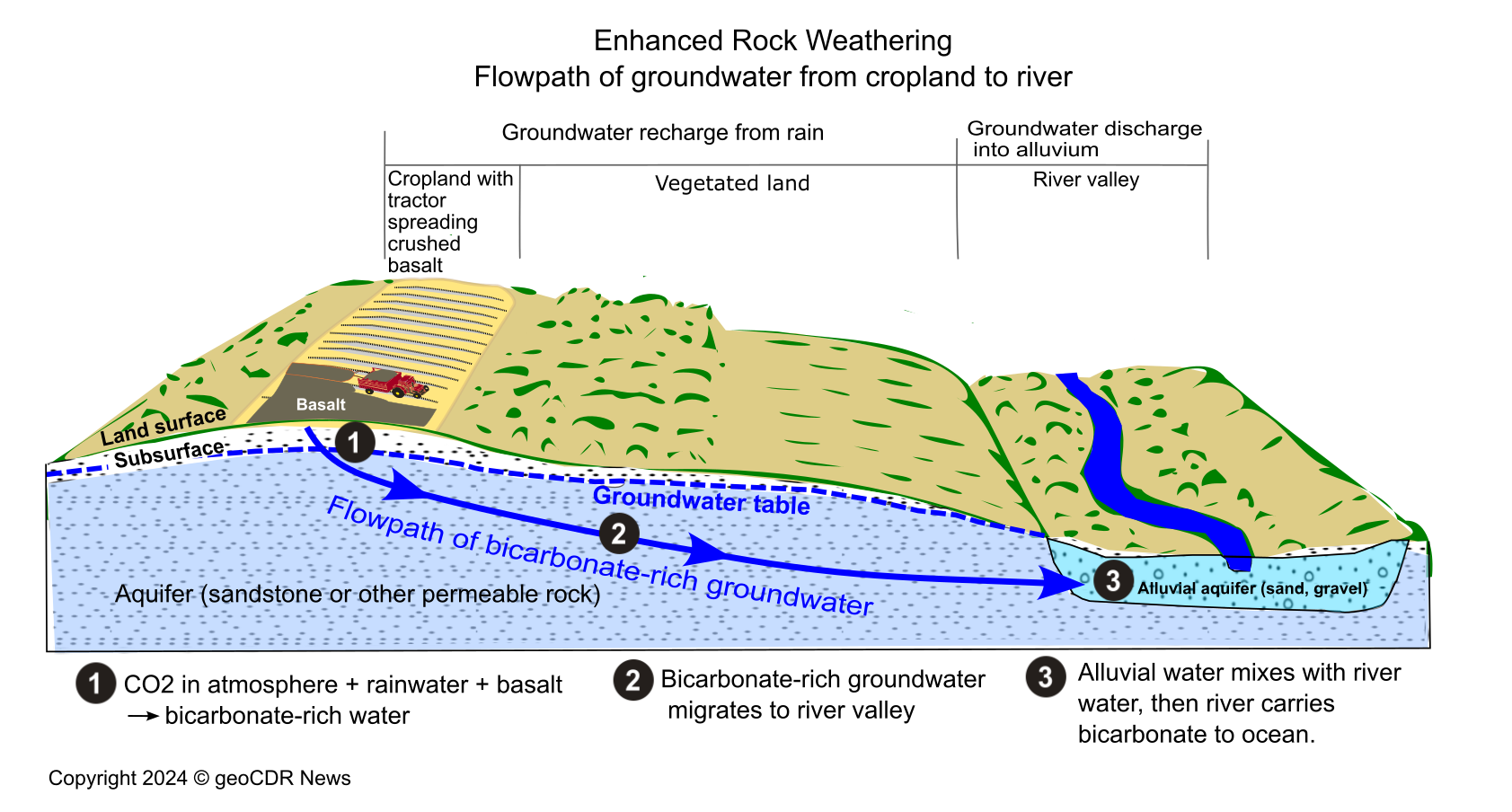Enhanced rock weathering is ramping up on smallholder farms in central India

Enhanced rock weathering remains a nascent method of carbon dioxide removal (CDR) and is currently practiced commercially in only a few locations worldwide. However, its adoption is accelerating, driven by support from philanthropic organizations, government grants, and carbon credit sales.
One geographic area seeing increasing use of enhanced weathering is in the central Indian states of Chhattisgarh, Madhya Pradesh, and Jharkhand where in the last three years Mati Carbon has enabled more than smallholder farmers to spread more than 80,000 of crushed on their farms which average less than 4 hectares each of cropland, mainly rice paddies.
Mati Carbon was founded in 2022, incubated as a project of the nonprofit, Swaniti Initiative, based in Houston, Texas (USA). According to its website, Swaniti is funded by donations, with several large U.S. corporations listed as donors on their website. Swaniti's aim is to boost the delivery of public services to the most economically vulnerable populations in India by strengthening governance and administration.
Mati is a (PBC) that has dual goals of benefiting the public (in their case, smallholder marginally economic farmers), while at the same time making a profit for the company. Shantanu Agarwal, founder and CEO of Mati Carbon, has provided details of Mati's operations in two interviews on the podcast OpenAir - This is CDR. Mr. Agarwal has a Bachelor of Technology degree in chemical engineering from Indian Institute of Technology, Roorkee and an MBA from Harvard University. Mati's website provides additional information.
Mati's field operations - From farm field to carbon storage in the ocean
A typical farmer in Mati's program grows rice on a hectare of land, often on individual fields as small as one-half acre. Mati delivers finely ground basalt to the farmers who spread the crushed basalt on the cultivated fields as a soil amendment. Mati also collects samples of soil, ground water, and surface water as part of its monitoring, reporting, and verification program (see description below).
In general, the pathway to permanent storage of CO2 using enhanced rock weathering occurs in several steps (see figure below). CO2 gas dissolved in rainwater and in soil water forms a mild acid, carbonic acid. This acid dissolves minerals in the basalt soil amendment, producing the chemical compound bicarbonate . Calcium, magnesium, and other elements are released from the basalt in the dissolution process.

The bicarbonate-laden soil water migrates into groundwater, which eventually discharges into rivers that carry the dissolved bicarbonate to the ocean. The bicarbonate remains permanently stored, dissolved in ocean water.
Basalt source
Basalt that is used in Mati's operation is mined from the vast Deccan area in India (see OpenAir - This is CDR, Episode 75). The Deccan Traps occur along the west side of the Chhattisgarh basin where Mati's enrolled farms are located.
The Deccan Traps are well-known in geology circles as one of the world's so-called "large igneous provinces", similar in origin to the Siberian Traps of Russia and the Columbia Plateau Basalts in the Pacific Northwest region of North America.

Mati is using Deccan Trap basalt rather than other types of silicate rock such as dunite or peridotite that would have a higher content of hazardous heavy metals such as nickel and chromium. The minimum size of crushed basalt grains is limited to 100 to protect farm workers from inhalation of hazardous silica dust.
Field application rates of basalt and modelled carbon removal amounts
Agarwal explained in the 2023 that figures on basalt application rates and net carbon removal are evolving, and they vary depending on pH and other soil characteristics, but rough averages may be "in the neighborhood of" 10 tonnes per hectare as an application rate, with 20% to 30% net carbon removal depending on rock characteristics.
Monitoring, reporting, and verification of carbon removal amount
Mati's verification of the amount of carbon removed in the basalt-amended soil is based on developed in collaboration with Yale University's Center for Natural Carbon Capture, University of Sheffield's Leverhulme Centre for Climate Change Mitigation, and other research partners at academic and private institutions. Mati's chief science officer, Jake Jordan, co-authored a technical paper on the verification method, along with prominent CDR researchers David Beerling and Noah Plavasky who serve as science advisors to Mati.
The verification method is a mass-balance calculation of the amount of basalt that is dissolved (weathered) in soils. The calculation uses data from samples of soil, ground water, and surface water collected from croplands. The amount of Ca+ and Mg+ that are released from the basalt during weathering indicates the amount of bicarbonate produced and thus the amount of CO2 removed from the atmosphere by the rock weathering process. Samples are collected at various times during these multi-year projects. A large number of samples are required due to the variability of soil properties on the farms.
Mati enters the data from farm soils and water samples into a computer model to estimate the amount of bicarbonate that will end up in the ocean as a result of enhanced basalt weathering. Bicarbonate dissolved in ocean water has long-term chemical stability of more than , thus sequestering the carbon essentially forever. The bicarbonate estimate is discounted for losses of bicarbonate that may occur along the flow pathway from a farm to the ocean due to such factors as evaporation or being diverted away from the pathway by flowing ground water or surface water.
Benefits to farmers - Soil improvement, increased crop yields, less fertilizer and pesticides
Mati supplies the crushed basalt to farmers free of charge in exchange for Mati receiving the revenue from carbon credit sales.
ERW has been in a U.S. cropland study to improve crop yields by adding macronutrients (e.g., Mg, Ca), improving soil structure, and improving moisture retention in the soil. Soil quality on many smallholder farms in central India is degraded from centuries of farming. Farmers are reporting benefits from the Mati's ERW process in the form of reduced fertilizer and pesticide needs. Ashish Kumar, a strategic adviser to Mati, on the website ImpactAlpha that in a 2022 trial of Mati's technology, the estimated annual savings to each farmer was $130 — nearly as much as one month's income for a farmer. Also, farmers have reported increases in crop yields of 8.9% tp 35%, according to Mati Carbon's website.
Benefit to Mati - Carbon credit sales
Selling carbon credits is necessary for Mati's ERW program to be self-sustaining.
Mati's first sale and delivery of carbon credits was 50 tonnes, sold to in March 2024. Price was not disclosed. Frontier is a U.S. based company that aggregates carbon credit buyers and suppliers, and then facilitates the transfers of credits between the buyers and suppliers. Although 50 credits is a small amount, Mati emphasizes the delivery was historically significant because it is the first delivery of any type of engineered carbon credits in the . Frontier purchased an additional 420 tonnes from Mati later in 2024. Frontier has contracted the pre-purchase of a total of 1,513 tonnes from Mati.
On May 1, 2024, Mati announced it has been selected as a CDR supplier by Klarna, Spotify, and others, as part of the Milkywire Climate Transformation Fund. Milkywire is a U.S.-based philanthropic organization that aggregates financial donations and distributes the funds to CDR suppliers based on the number of tonnes of carbon dioxide removed.
Awards and recognition
2024 and 2025 have been banner years for Mati as it has received cash awards and recognition for its pioneering work.
Mati received a $50,000 grant from the the U.S. Department of Energy in 2024 to support scaling up its technology. Also in 2024, Mati won a $1 million grant from the Bezos Earth Fund for supporting development of MRV systems tailored to local agroecological zones in Tanzania. Then in April 2025, Mati won the $50 million grand prize in the Musk Foundation's XPRIZE for carbon removal.
The Musk Foundation said in its announcement of the $50 million award, "Mati Carbon’s team has developed a scientifically rigorous approach to monitoring and verification, and excelled across each of XPRIZE’s evaluation criteria – operational, sustainability, and cost metrics – giving the XPRIZE judges the highest confidence in Mati Carbon’s solution’s long-term scalability."
New debt funding and Plans for scaling up
A further boost to Mati's expansion came in May 2025, with the announcement of a debt facility the company will receive from investment banking firm J.P. Morgan. Terms of the debt facility were not announced, other than it was negotiated on "commercial terms".
According to Mati's website, it plans to expand ERW operations into three additional states in India in the next 12 months. Mati is also working to expand ERW operations into Africa where it is partnering with the volunteer organization "Engineers Without Borders" in Tanzania and the Mukuni Trust in South Zambia.